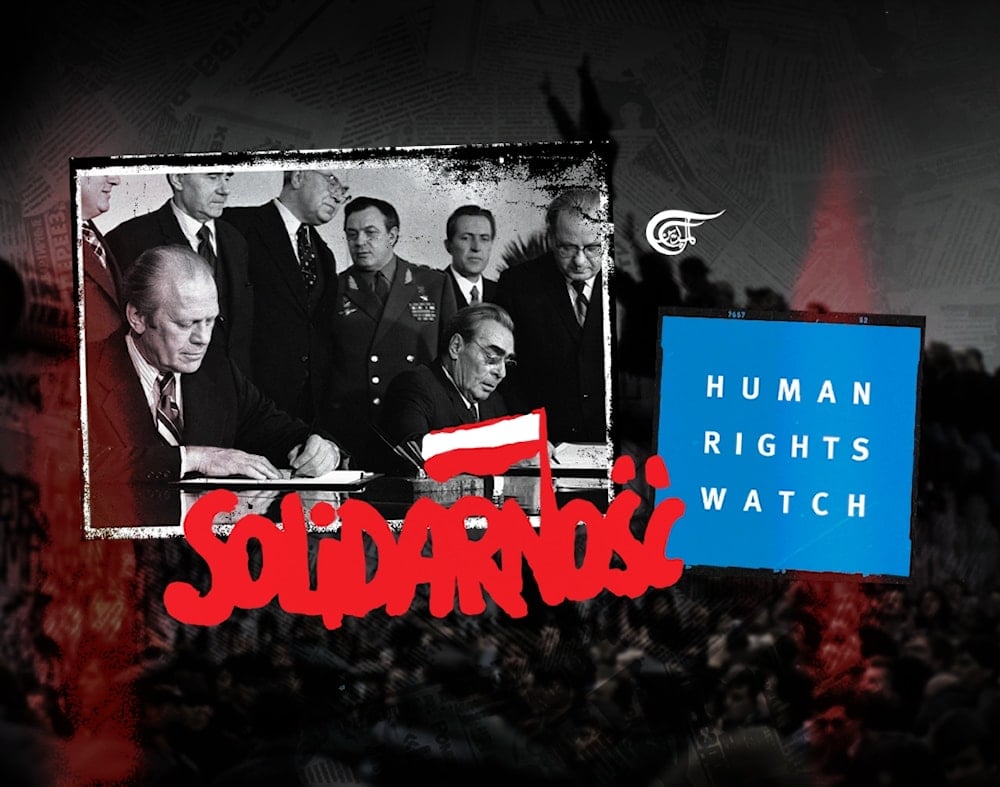How ‘Human Rights’ became a Western weapon
Kit Klarenberg exposes how the West weaponized “human rights” after the Helsinki Accords, turning a noble idea into a tool for regime change, sanctions, and imperial wars.
-

Almost instantly after the Helsinki Accords were signed, organisations sprouted to document purported violations, whose findings were fed to overseas embassies for international amplification. (Al Mayadeen English; Illustrated by Zeinab el-Hajj)
August 1st marked the 50th anniversary of the Helsinki Accords’ inking. The event’s golden jubilee passed without much in the way of mainstream comment, or recognition. Yet, the date is absolutely seismic, its destructive consequences reverberating today throughout Europe and beyond. The Accords not only signed the death warrants of the Soviet Union, Warsaw Pact, and Yugoslavia years later, but created a new world, in which “human rights” - specifically, a Western-centric and enforced conception thereof - became a redoubtable weapon in the Empire’s arsenal.
The Accords were formally concerned with concretising détente between the US and the Soviet Union. Under their terms, in return for recognition of the latter’s political influence over Central and Eastern Europe, Moscow and its Warsaw Pact satellites agreed to uphold a definition of “human rights” concerned exclusively with political freedoms, such as freedom of assembly, expression, information, and movement. Protections universally enjoyed by the Eastern Bloc’s inhabitants - such as guarantees of free education, employment, housing, and more - were wholly absent from this taxonomy.
There was another catch. The Accords led to the creation of several Western organisations charged with monitoring the Eastern Bloc’s adherence to their terms - including Helsinki Watch, forerunner of Human Rights Watch. Subsequently, these entities frequently visited the region and forged intimate bonds with local political dissident factions, assisting them in their anti-government agitation. There was no question of representatives from the Soviet Union, Warsaw Pact, or Yugoslavia being invited to assess “human rights” compliance at home or abroad by the US or its vassals.
As legal scholar Samuel Moyn has extensively documented, the Accords played a pivotal role in decisively shifting mainstream rights discourse away from any and all economic or social considerations. More gravely, per Moyn, “the idea of human rights” was converted “into a warrant for shaming state oppressors.” Resultantly, Western imperialist brutality against purported foreign rights abusers - including sanctions, destabilisation campaigns, coups, and outright military intervention - could be justified, frequently assisted by the ostensibly neutral findings of organisations such as Amnesty International, and HRW.
Almost instantly after the Helsinki Accords were signed, a welter of organisations sprouted throughout the Eastern Bloc to document purported violations by authorities. Their findings were then fed - often surreptitiously - to overseas embassies and rights groups, for international amplification. This contributed significantly to both internal and external pressure on the Soviet Union, Warsaw Pact, and Yugoslavia. Mainstream accounts assert the conception of these dissident groups was entirely spontaneous and organic, in turn compelling Western support for their pioneering efforts.
US lawmaker Dante Fascell has claimed the “demands” of “intrepid” Soviet citizens “made us respond.” However, there are unambiguous indications that meddling in the Eastern Bloc was hardwired into Helsinki before inception. In late June 1975, on the eve of US President Gerald Ford signing the Accords, exiled Soviet dissident Alexander Solzhenitsyn addressed senior politicians in Washington, DC. He appeared at the express invitation of hardcore anti-Communist George Meany, chief of the CIA-connected American Federation of Labor and Congress of Industrial Organizations (AFL-CIO). Solzhenitsyn declared:
“We, the dissidents of the USSR don’t have any tanks, we don’t have any weapons, we have no organization. We don’t have anything...You are the allies of our liberation movement in the Communist countries…Communist leaders say, ‘Don’t interfere in our internal affairs’...But I tell you: interfere more and more. Interfere as much as you can. We beg you to come and interfere.”
‘Political Aberration’
In 1980, mass strikes in Gdansk, Poland, spread throughout the country, leading to the founding of Solidarity, an independent trade union and social movement. Key among its demands was that the Soviet-supported Polish government distribute 50,000 copies of Helsinki’s “human rights” protocols to the wider public. Solidarity founder-and-chief Lech Walesa subsequently referred to the Accords as a “turning point”, enabling and encouraging the union’s nationwide disruption, and growth into a serious political force. Within just a year, Solidarity’s membership exceeded over 10 million.
The movement’s inexorable rise sent shockwaves throughout the Warsaw Pact. It was the first time an independent mass organisation had formed in a Soviet-aligned state, and others would soon follow. Undisclosed at the time, and largely unknown today, Solidarity’s activities were bankrolled to the tune of millions by the US government. The same was true of most prominent Eastern Bloc dissident groups, such as Czechoslovakia’s Charter 77. In many cases, these factions not only ousted their rulers by the decade’s end, but formed governments thereafter.
Washington’s financing for these efforts became codified in a secret September 1982 National Security Directive. It stated “the primary long-term US goal in Eastern Europe” was “to loosen the Soviet hold over the region and thereby facilitate its eventual reintegration into the European community of nations.” This was to be achieved by “encouraging more liberal trends in the region…reinforcing the pro-Western orientation of their peoples…lessening their economic and political dependence on the USSR…facilitating their association with the free nations of Western Europe.”
In August 1989, mere days after Solidarity took power in Poland, marking the first post-World War II formation of a non-Communist government in the Eastern Bloc, a remarkable op-ed appeared in the Washington Post. Senior AFL-CIO figure Adrian Karatnycky wrote about his “unrestrained joy and admiration” over Solidarity’s “stunning” success in purging Soviet influence in the country throughout the 1980s. The movement was the “centerpiece” of a wider US “strategy”, and had been funded and supported by Washington with the utmost “discretion and secrecy.”
Vast sums funnelled to Solidarity via AFL-CIO and CIA front the National Endowment for Democracy “underwrote shipments of scores of printing presses, dozens of computers, hundreds of mimeograph machines, thousands of gallons of printer’s ink, hundreds of thousands of stencils, video cameras and radio broadcasting equipment.” The wellspring promoted Solidarity’s activities locally and internationally. In Poland itself, 400 “underground periodicals” - including comic books featuring “Communism as the red dragon” and Lech Walesa “as the heroic knight” - were published, read by tens of thousands of people.
Karatnycky boasted of how the Empire was intimately “drawn into the daily drama of Poland’s struggle” over the past decade, and “much of the story of that struggle and our role in it will have to be told another day.” Still, the results were extraordinary. Writers for Warsaw’s NED-funded “clandestine press” had suddenly been transformed into “editors and reporters for Poland’s new independent newspapers.” Former “radio pirates” and Solidarity activists previously “hounded” by Communist authorities were now elected lawmakers.
Signing off, Karatnycky hailed how Poland proved to be a “successful laboratory in democracy-building,” warning “democratic change” in Warsaw could not be a “a political aberration” or “lone example” in the region. Karatnycky looked ahead to further neighbourhood insurrection, noting AFL-CIO was engaged in outreach with trade unions elsewhere in the Eastern Bloc, including the Soviet Union itself. So it was, one by one, every Warsaw Pact government collapsed in the final months of 1989, often in enigmatic circumstances.
‘Shock Therapy’
The “revolutions” of 1989 remain venerated in the mainstream today, hailed as examples of peaceful transitions from dictatorship to democracy. They have also served as a template and justification for US imperialism of every variety in the name of “human rights” in all corners of the globe since. Yet, for many at the forefront of Western-funded, Helsinki Accords-inspired Warsaw Pact dissident groups, there was an extremely bitter twist in the tale of the overthrow of Communism in Central and Eastern Europe.
In 1981, Czechoslovak playwright and Charter 77 spokesperson Zdena Tominová conducted a tour of the West. In a speech in Dublin, Ireland, she spoke of how she’d witnessed first-hand how her country’s population had benefited enormously from the state’s Communist policies. Tominová made clear she sought to fully maintain all its public-wide economic and social benefits, while adopting Western-style political freedoms only. It was a shocking statement to make for a woman who’d risked imprisonment to oppose her government with foreign help so publicly:
“All of a sudden, I was not underprivileged and could do everything…I think that, if this world has a future, it is as a socialist society, which I understand to mean a society where nobody has priorities just because he happens to come from a rich family,” Tominová declared. She moreover made clear her vision was global in nature - “the world of social justice for all people has to come about.” But this was not to be.
Instead, Eastern Bloc countries suffered deeply ravaging transitions to capitalism via “shock therapy”, eradicating much of what citizens held dear about the systems under which they’d previously lived. They were thrust into a wholly new world, where hitherto unknown homelessness, hunger, inequality, unemployment, and other societal ills became commonplace, rather than prevented by basic state guarantee. After all, as decreed by the Helsinki Accords, such phenomena didn’t constitute egregious breaches of “human rights”, but instead were the unavoidable product of the very political “freedom” for which they had fought.

 Kit Klarenberg
Kit Klarenberg
 9 Min Read
9 Min Read











